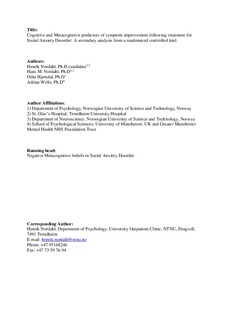Cognitive and metacognitive predictors of symptom improvement following treatment for social anxiety disorder: A secondary analysis from a randomized controlled trial
Journal article, Peer reviewed
Accepted version
Date
2017Metadata
Show full item recordCollections
- Institutt for psykisk helse [1221]
- Institutt for psykologi [3066]
- Publikasjoner fra CRIStin - NTNU [37963]
Abstract
Cognitive therapy for social anxiety disorder (SAD) based on the Clark and Wells model emphasizes negative beliefs about the social self and self‐consciousness as central causal factors. However, Wells’ metacognitive model proposes that metacognitive beliefs are central to pathology universally. The relative importance of cognitive and metacognitive beliefs in the treatment of SAD is therefore an important research question. This study examined change in negative cognitive and negative metacognitive beliefs as independent correlates of symptom improvement in 46 SAD patients undergoing evidence‐based treatments. Both types of beliefs decreased during treatment. However, change in metacognitive belief was the only consistent independent predictor across all outcomes and change in cognitive beliefs did not significantly predict outcomes when change in self‐consciousness was controlled. The implication of this finding is that metacognitive change might be more important than cognitive belief change in symptom outcome and recovery in SAD.
